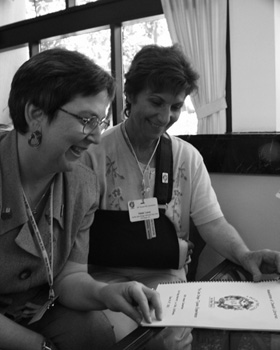| By
Donald H. Harrison
San Diego, CA (special) -- Dewey, Elazar and Weine are neither a law
firm nor an accounting firm. But they have a firm hold on how members of
the Association of Jewish Librarians think about books.
 |
Each of these names is associated with a different methodology
for classifying books. Public libraries use the Dewey Decimal System, which
divides all knowledge into ten broad subject areas, then subdivides those
areas, and even subdivides the subdivisions.
Under Dewey's broad classification for religion, "Judaism has a specific
number--296," Barbara Sutton, chief librarian at the Lawrence Family
JCC's Astor Judaic Library, said during the association's convention
last week at the La Jolla Marriott Hotel.
Jewish holidays are distinguished from life cycle events, or synagogue
rituals, by numbers that come after the decimal point following the
number 296, said Sutton, who served as the convention co-chair this
year with Nomi Levy of Soille Hebrew Day School's Abraham Hurlich Memorial
Library.
"Sometimes, the decimal points could go round the book binding," Sutton
quipped. Levy |
LIRARIANS--Barbara Sutton, left, Chief
librarian
at the Lawrence Family JCC, and Nomi Levi, chief
librarian at Soille San Diego Hebrew Day School,
look over the program of events of the Association
of Jewish Librarians, which held its national
convention in San Diego last week at the La Jolla
Marriott. |
laughed knowingly.
Although the JCC
and Soille both have Jewish libraries, their needs are
very different. As strange as it may seem, the library at the "secular"
Jewish Community Center overall tends to be "more religious" than the
library at the "Orthodox" Soille
San Diego Hebrew Day School, the two
librarians agreed.
Because the JCC sees itself as a specialty library, which supplements
the
offerings at public libraries, it focuses its collection exclusively
on
Jewish subject matter. On the other hand, as a day school--which
teaches both secular subjects and Judaic subjects--Soille needs a library
that reflects the school's broad curriculum. Thus books on mathematics
and astronomy, which would be irrelevant to the JCC's collection, share
space on Soille's shelves with prayer books and Torah commentaries.
Because Soille students will look for books both at the public library
and
at the school library, Levy said it was decided at Soille to use an
adaptation of the Dewey system -- known as the Weine System. Rather
than cramming all the Jewish books under Dewey's 296 heading, the Weine
System assigns books on various Jewish topics to shelves with non-
Jewish books about corresponding topics.
Books on Israel, for example, are housed with books about other countries
in the Middle East, under the Decimal Number 950, Levy said.
The JCC does not need to integrate Judaic knowledge and general
knowledge, so Sutton utilizes a classification system devised by the
Elazar Brothers.
"Their system is conceptually the same as the Dewey Decimal System,"
Sutton said. "Everything is into 10 categories, but they have different
numbers for the different areas. So we wouldn't find a book on Israel
in
the 950s, but rather in the 800s."
The JCC librarian said that different classification systems are not
the
only reason for books being shelved differently at various libraries.
"You could go to two different public libraries, catalogued by two
different people, and you might find the same book in two different
places," she said.
Levy told of a book which deals both with the holiday of Chanukah and
with
the Holocaust. She explained that some librarians might place it under
"Chanukah" while others shelve it with other books on the "Shoah."
Couldn't a copy be placed in both areas? I asked.
"Yes," said Sutton, "until someone who thinks they are helping you see
them in different places and decides to put them in the 'right' place!"
Levy laughingly agreed that "this happens a lot." |

